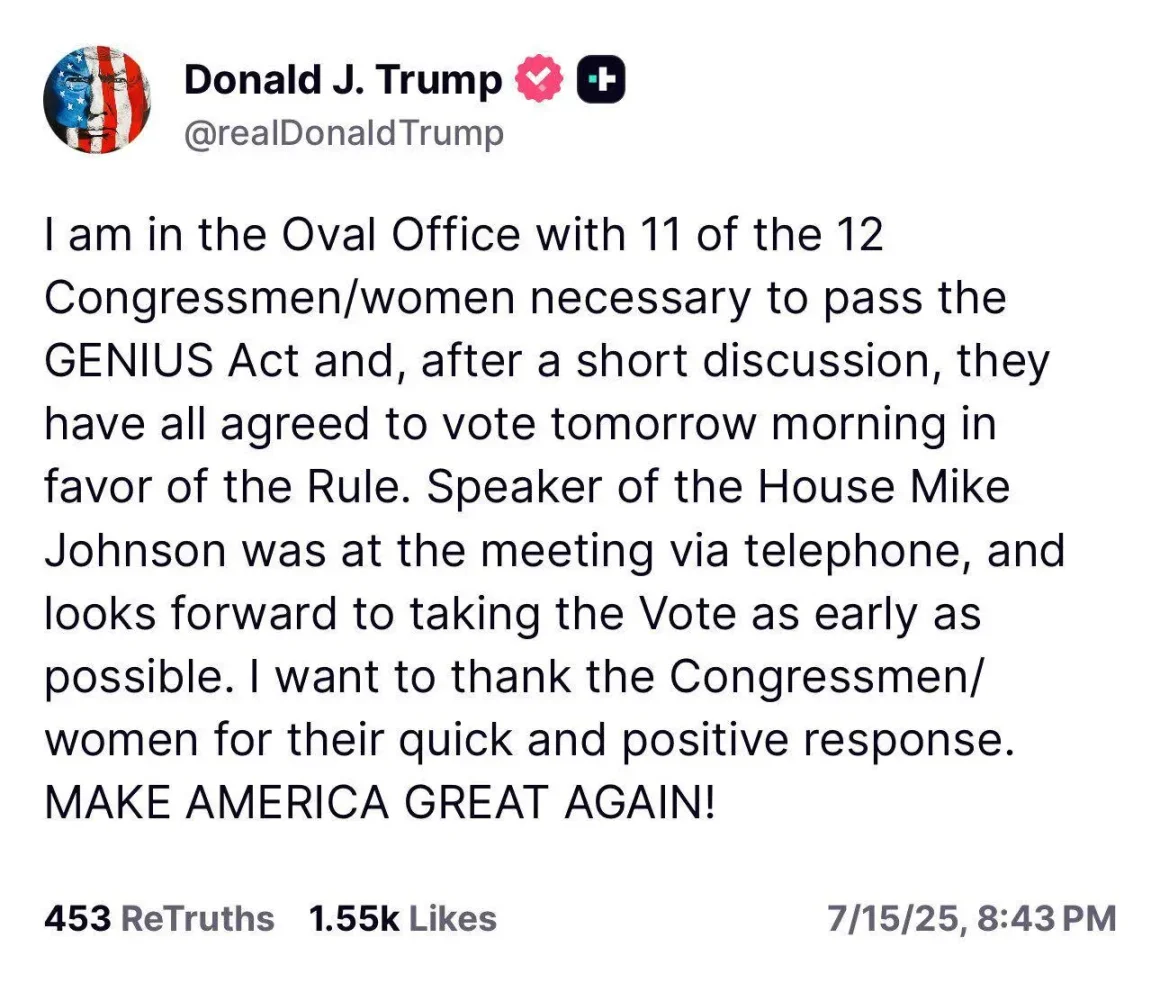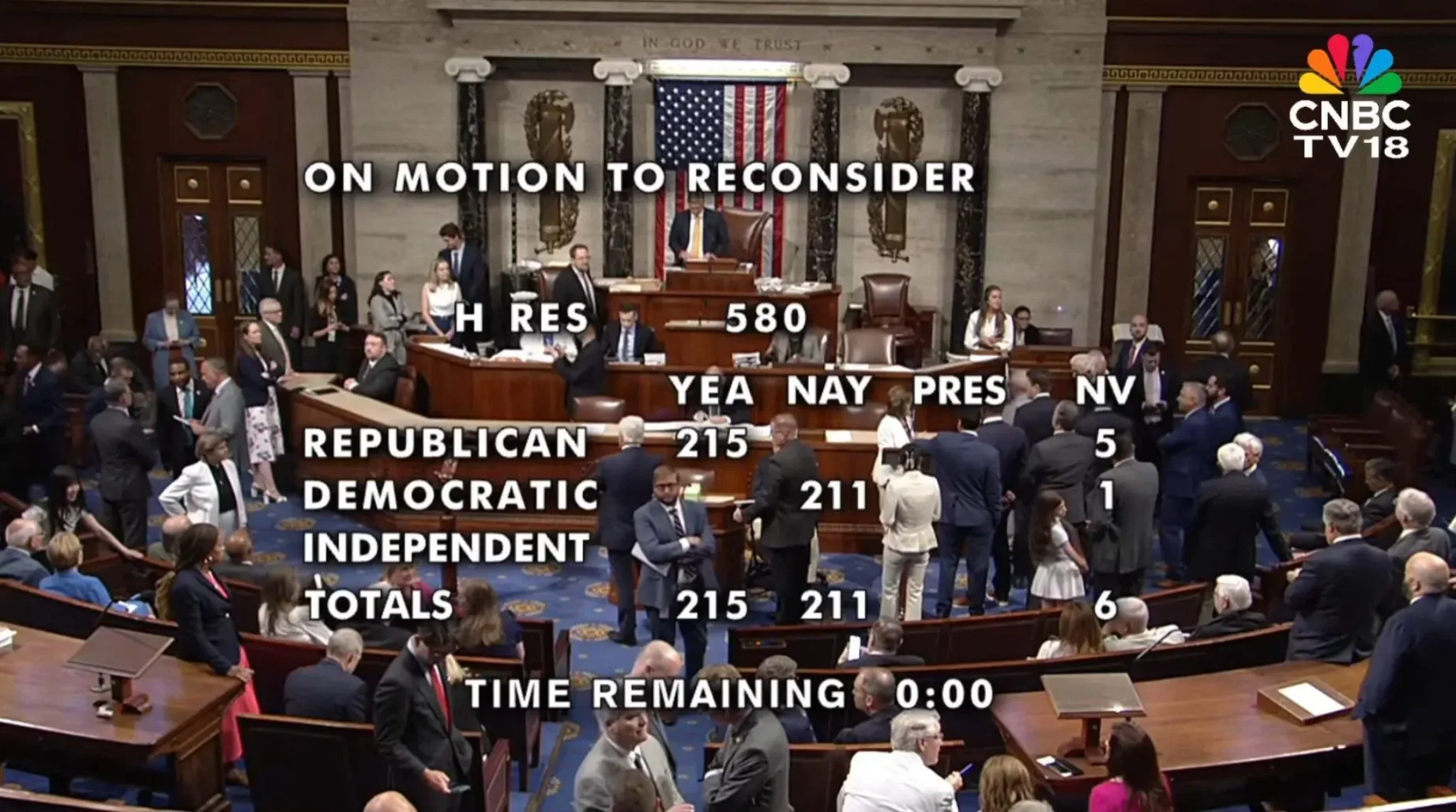The latest vote by the U.S. House of Representatives on three cryptocurrency-related legislations lasted over nine hours, setting a record for the duration of procedural voting in the House.
Written by: Weilin, PANews
On July 17 (local time Wednesday), the U.S. House of Representatives passed a procedural vote on three significant cryptocurrency bills, paving the way for the votes on the "GENIUS Act," "Clarity Act," and "Anti-CBDC Act," which are expected to be voted on again on Thursday local time.
Although July 14 was announced as "Crypto Week" in the House, the actual voting process was fraught with twists and turns. On Tuesday afternoon local time, the House voted 196 to 223 against advancing the three proposals, with 12 Republicans opposing and expressing concerns about the ambiguity of the "GENIUS Act" regarding CBDCs.
Record-breaking 9-hour vote! The three bills ultimately advanced, with the GENIUS Act making the fastest progress
The latest vote on July 17 (local time Wednesday) lasted over 9 hours, setting a record for procedural voting in the House. Finally, around 11 PM, the House passed Resolution No. 580 for the consideration of multiple bills, with a vote result of 217 in favor and 212 against. Just a day earlier, this bill unexpectedly failed to pass the House's procedural vote.
When House Majority Leader Steve Scalise announced that Republicans would attach a CBDC ban to the National Defense Authorization Act (NDAA), the previous issues were resolved, ensuring that the CBDC ban would pass alongside the must-pass NDAA, prompting the eight conservative Republicans who had blocked the bill on Tuesday to ultimately change their votes.
According to PunchBowl News, after the successful vote, House Majority Leader Steve Scalise stated that the next round of House votes on these cryptocurrency bills would take place on Thursday.
Currently, among the three cryptocurrency-related bills, the "GENIUS Act" is considered to be making the fastest progress. This bill aims to establish a regulatory framework for stablecoins and was passed by the Senate last month. The GENIUS Act may be sent to President Trump for signing before the end of this week.
The other two proposals include the "Digital Asset Market Clarity Act" (Clarity Act), which takes a more comprehensive approach to create a regulatory framework for digital assets, clarifying the regulatory roles of the Securities and Exchange Commission (SEC) and the Commodity Futures Trading Commission (CFTC).
Lawmakers also voted to consider the Anti-CBDC Act, which aims to prevent the Federal Reserve from directly issuing central bank digital currency to individuals. Even if the Clarity Act and Anti-CBDC Act pass the House vote, they still need to be voted on in the Senate.
President Trump personally meets with lawmakers, calls to urge the advancement of the legislative process
According to Politico, a breakthrough in the stalemate on Wednesday occurred at the last moment of negotiations when President Trump called the office of House Speaker Mike Johnson and expressed satisfaction with the agreement reached.
As early as the morning of July 15, Trump stated on social media platform Truth Social, "Happy Crypto Week! The House will soon vote on a significant bill aimed at making the U.S. the undisputed global leader in digital assets," urging House members to pass the procedural vote.
However, on Tuesday, the House voted 196 to 223 against advancing the proposal for the rule, with 12 Republicans opposing and expressing concerns about the ambiguity of the "GENIUS Act" regarding CBDCs. In reality, some provisions in the "GENIUS Act" explicitly prohibit the Federal Reserve from creating CBDCs.
After the voting failure, on the evening of July 15, Trump quickly summoned the opposing lawmakers to the White House and announced that he had persuaded them all to support the measure. On July 16, President Trump posted that he met with 11 House members in the Oval Office on July 15 to discuss passing the "GENIUS Act" legislative rules, and they unanimously agreed to support the rule the next morning.

By Wednesday, the initial vote dramatically ended with 215 votes in favor and 211 against. The voting results were not revealed until the last moment, with a small number of Republicans opposing the rule until intense exchanges with party leadership on the House floor prompted them to change their votes to "in favor" at the last moment.
However, these staunchly opposing Republicans later withdrew their support in a second "record vote," leaving the House floor to negotiate with party leadership on potential agreements to advance the legislation, contingent on clearer revisions to the wording of the CBDC ban.

Republican hardliners who blocked the procedural vote for the bill pushed to merge the market structure bill "CLARITY Act" with a partisan legislation banning central bank digital currency. Republican Representatives French Hill, chair of the Financial Services Committee, and G.T. Thompson from Pennsylvania opposed this plan, fearing it would weaken Democratic support for the market structure bill.
After Republican leaders indicated they would attach the CBDC ban (which conservatives believe would open the door to privacy violations with a government-issued digital dollar) to a must-pass National Defense Authorization Act, the Republican rebels dropped their opposition. This agreement was reached after a late-night meeting in House Speaker Mike Johnson's office.
According to two anonymous attendees, Trump called in at the last moment and was briefly briefed on the agreement's content. "He was very pleased with it," one of the individuals said.
At 4 AM on July 17, according to two informed sources, the U.S. Senate Banking Committee was delaying the release of a market structure discussion draft originally scheduled for the next day. Their thought was to wait and observe the House's movements and reconsider introducing the bill when the situation became more "clear."
According to Politico, the vote on the "CLARITY Act" may be postponed until next week.
It is expected that the "GENIUS Act" will be sent to President Trump for signing within this week, becoming the first significant cryptocurrency bill passed by Congress, marking a major lobbying victory for cryptocurrency companies.
Overall, the House's "Crypto Week" has profound implications for the digital asset space. These bills could not only reshape the landscape of the U.S. cryptocurrency industry but also set important foundational precedents for the future regulation of digital assets. With the advancement of the bills and President Trump's intervention, will the regulatory framework continue to progress smoothly? Can the U.S. government fulfill its promise of becoming the "crypto capital"?
免责声明:本文章仅代表作者个人观点,不代表本平台的立场和观点。本文章仅供信息分享,不构成对任何人的任何投资建议。用户与作者之间的任何争议,与本平台无关。如网页中刊载的文章或图片涉及侵权,请提供相关的权利证明和身份证明发送邮件到support@aicoin.com,本平台相关工作人员将会进行核查。



